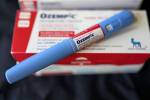Bypass surgery still common
By JORDAN WILSON
VIEW ON HEALTH
In Iva Smolens' mind, bypass surgery is a lot like unclogging a blocked pipe.
How do you fix the problem? You run a rooter through the pipe and if need be, she says you lay down new pipe to open up flow.
The same can be said for bypass surgery, said Smolens, a renowned cardiothoracic surgeon in Arizona.
Smolens uses the analogy as a way to explain coronary bypass surgery to some patients. Some people hear the word bypass and think of a reducing of the stomach. Others just aren't sure what bypass is or its purpose.
Coronary bypass can be a blessing for those who have clogged arteries. It can also be a very complicated procedure. Smolens thinks it's worth the risk, though.
"There are quite a few pluses and minuses," Smolens said. "But patients get a new lease on life."
Blocked arteries don't have to be the death of you. With coronary bypass surgery, the once-clogged arteries can breathe a little easier and pump more blood. A coronary bypass could be thought of as a transplant from one part of your body to another. A doctor will find a healthy blood vessel from another part of a patient's body, such as their abdomen, thigh, chest or arm. In short, a surgeon will replace a blocked artery in the heart with a healthy artery from another part of the body.
A blocked artery in the heart is not good news. These are essential to secure proper blood and oxygen flow to all parts of the body. These arteries are responsible for keeping the heart beating by providing constant oxygen and blood flow to the heart. If one of the arteries is blocked or slowed down in some way, the heart could be at risk. Hopefully, this problem will be spotted sooner rather than later. And that's where coronary bypass surgery comes into play.
"The goal of bypass and stents is to restore circulation to the heart muscle," Smolens said.
Whether a patient gets coronary bypass or angioplasty stents is dependent on the individual. If the left ventricle is not performing well, bypass surgery could be the best route. The left ventricle is the primary pump in the heart, and coronary bypass can address the problem. A coronary angioplasty can open up a clogged artery by blowing up a tiny balloon near the heart. Then, a piece of metal is used to prop the artery wall open and cut back on the likelihood of it closing or narrowing again. This small piece of metal is called a stent.
Dr. Richard Heuser is a clinical Professor of Medicine at the University of Arizona and the Director of Cardiology at St. Luke's Medical Hospital. He said the approach toward treated clogged and blocked arteries has changed over time.
"In the 70s and 80s, heart surgery really exploded on the scene as a way to treat heart disease," Heuser said. "Now we're seeing a transition. Angioplasty stents are having a huge impact."
While stenting is becoming more popular as it carries only about one-third the cost of a coronary bypass surgery, it doesn't mean it's the best option. One recent study showed that people who stenting over bypass had a six percent increased risk of either death or complications from the procedure.
A recent study from the federal Agency for Healthcare Research and Quality showed that fewer bypass surgeries were being performed and angioplasty stenting is slowly becoming the preferred way to treat blocked artery walls. People with more blocked arteries may opt for bypass while people with only one or two blocked arteries may opt for angioplasty or stenting, or the combination of the two.
"If a person is not a good candidate for stents, those patients have been shown to do better with bypass surgery," Smolens said.
So while there are pros and cons to each method, the goal is the same - to open up the blood supply.
"(Heart vessels) are like a hibernating bear - you can revive it by giving it better blood supply."
Coronary bypass shouldn't be the first resort to fix clogged or blocked arteries, though. Smoking is one of the largest risk factors and should be stopped before bypass is even considered. Also, establishing a healthy diet and exercising more are important before considering surgery. Lastly, there are medications that relieve some heart symptoms. If these methods don't reverse or slow the damage that is already done, then coronary bypass may be the best route.
After comparing treatments for opening up blood flow to coronary arteries, it's important to know who is a good candidate for the procedures. Not just anyone with chest pain should sign up for the procedure.
If you're ever sitting on the couch or walking at a slow pace and have a shortness of breath, it could be a sign of a blocked artery. Also, pain in the chest at any point should prompt a trip to the doctor.
There's no rule of thumb when it comes to who should get bypass and who shouldn't.
"The majority of time, we have to look at each patient individually," Smolens said. "There are very few no-brainers. But with young people ... I tend to be very aggressive."
One thing that does come into play, though, is age. Smolens said surgeons are much more likely to perform bypass on a younger person. Memory loss, bleeding and failure of the kidneys are all possible risks of bypass surgery. If you are a healthier person, you are less likely to run into such side effects, Smolens said. That's why it can be tricky when performing coronary bypass on very elderly people who are already sick. The risks can trump the rewards.
"The risk of complications is so high in 80-year-olds that we don't want to deteriorate their quality of life," Smolens said.
The procedure itself can last anywhere from three to seven hours. The surgery takes it toll, as it's normal to spend time in the Intensive Care Unit after bypass and usually around a week in the hospital.
Younger people and those in better health are much better candidates for the procedure, Smolens said.
"If you're kind of a normal, balanced person, you can shake it off and continue doing what you want to do," she said. "Older folks feel crippled by it."
Simply undergoing bypass surgery won't guarantee success, Smolens said. For example, if someone continues to smoke after bypass, their bypass grafts may only last for two or three years. If they don't smoke, they may last for 20 years.
"Lifestyle modifications impacts them tremendously," Smolens said. "You have to live a heart-healthy lifestyle, cut out smoking, cut out saturated fats from diet. That will make the surgery last longer."




















